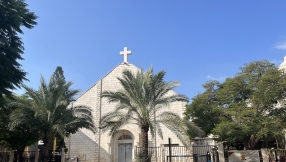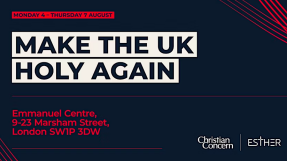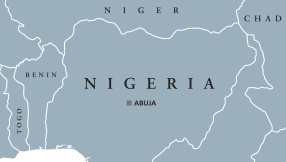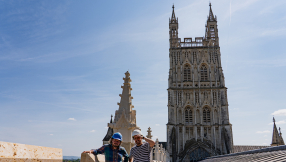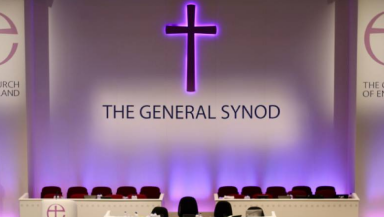
On Saturday, as many were watching the men’s doubles players battle it out on Centre Court at Wimbledon, the General Synod of the Church of England sat down to discuss a Measure (or law) to regularise the ministry of Church of England’s Chaplains to the Armed Forces.
As the Ven John Chaffey, the Archdeacon of Oxford and former Chaplain-in-Chief and head of the Royal Air Force Chaplains Branch, said, “This is in one sense just a tidying up of a small area of ecclesiastical law but in a wider and more important way it is enabling and supportive of the essential work carried out by chaplain to his majesty's forces.”
At the moment chaplains should be licensed by the bishop of every diocese that they serve in, which as the Rev James Menzies told Synod would be very difficult for him.
“As a Reservist Chaplain, my area of ministry extends across many different counties ranging from Shropshire in the north, Gloucestershire down to the south and Wiltshire, Dorset, Devon and so on,” he said - an area that would cover at least 10 different dioceses.
The solution that was put forward is that all chaplains are to be licensed by the Archbishop of Canterbury to serve throughout the Church of England as well as when on deployment abroad.
Something of which the Ven Luke Miller, whose son is serving in the Western Approaches, approved of.
“When on duty,” he said, “they need to be able to go safely and immediately where their ministry takes them. They need proper checks and accreditation, but they don't need unnecessary bureaucracy. They don't need complexity in that moment. They don't need that to get in the way of their work and ministry of what is for our nation and for the world a highly dangerous and stressful time.”
The Rev Martin Davy, himself a chaplain to the fire service, agreed, “Our chaplains go where people go. They preach, they pray, they pastor in barracks and on bases and in conflict zones and on ships. And we're recognizing in this measure their calling does not sit neatly within diocesan maps. It follows the men and women of our armed forces wherever they go.”
So, while over at Wimbledon Cash and Glasspool had to fight off the serves and volleys of their opponents before they could lift the trophy, at the Synod in York this was a motion that no one contested.
Instead, a stream of chaplains, as well as those who had served, or still served, in the Armed Forces or were from military families or communities, helped Synod to understand how vital a role both chaplains and local churches play in the lives of so many.
Michaela Suckling, a lay member of Synod spoke of how she felt when her father went to serve in the Falkland Islands.
“Thankfully, my father was not deployed to a war zone. Had he been, I would have taken great comfort knowing he had the opportunity to make his confession, receive the anointing of the sick or viaticum for his last journey if needed, and knowing that he was ministered to and prayed for by someone he knew and trusted. Please allow our chaplain the honour of sending our men and women into battle fully prepared in body, mind, and spirit with no doubt of the forgiveness of their sins," she said.
Yet, it was not just her father that needed support. Michaela challenged Synod members to remember the families too. “What can you offer frightened children trying so hard to be good and not to upset Mum while dealing with their own emotions? What can you offer spouses, partners, or parents of those left behind? Maybe space to talk or a break from the kids, or something practical like taking them shopping. I still remember those awful bus trips on a Saturday morning, spreading the shopping bags between us because my Mum didn't drive.”
Looking more widely, she asked, “Churches, are you ready to respond to disclosures of domestic abuse when that person feels safe enough to do so when their partner is away?”
Collaboration between chaplains and local churches goes beyond the practical, with stories of churches baptising service men and women at short notice and discipling them for as long as they resident in the area.
The uncertainty for all involved of rapid deployment and lengthy periods away from home was brought home by John Wilson, himself a veteran, who told Synod about a colleague who "went off to work one morning, ready to sit there and see if they were deployed and his wife and family didn’t see him for six months. That wasn’t planned – so there has to be flexibility.”
In the end the debate was best summarised by the Rev Paul Cartwright’s comment that, “This isn't about bypassing Episcopal oversight. It's about enabling ministry in extraordinary settings.”
With that in mind, it was perhaps unsurprising that General Synod was for once unanimous in their support of both the motion and the Measure.
Susie Leafe is director of Anglican Futures, an organisation that provides pastoral and practical support to orthodox Anglicans.










